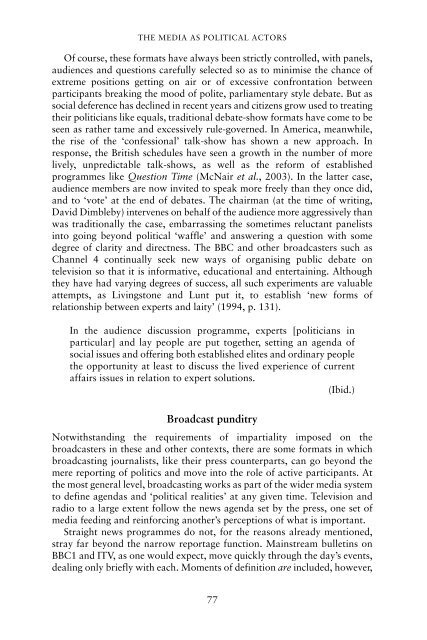20130412164339753295_book_an-introduction-to-political-communication
20130412164339753295_book_an-introduction-to-political-communication
20130412164339753295_book_an-introduction-to-political-communication
You also want an ePaper? Increase the reach of your titles
YUMPU automatically turns print PDFs into web optimized ePapers that Google loves.
THE MEDIA AS POLITICAL ACTORS<br />
Of course, these formats have always been strictly controlled, with p<strong>an</strong>els,<br />
audiences <strong>an</strong>d questions carefully selected so as <strong>to</strong> minimise the ch<strong>an</strong>ce of<br />
extreme positions getting on air or of excessive confrontation between<br />
particip<strong>an</strong>ts breaking the mood of polite, parliamentary style debate. But as<br />
social deference has declined in recent years <strong>an</strong>d citizens grow used <strong>to</strong> treating<br />
their politici<strong>an</strong>s like equals, traditional debate-show formats have come <strong>to</strong> be<br />
seen as rather tame <strong>an</strong>d excessively rule-governed. In America, me<strong>an</strong>while,<br />
the rise of the ‘confessional’ talk-show has shown a new approach. In<br />
response, the British schedules have seen a growth in the number of more<br />
lively, unpredictable talk-shows, as well as the reform of established<br />
programmes like Question Time (McNair et al., 2003). In the latter case,<br />
audience members are now invited <strong>to</strong> speak more freely th<strong>an</strong> they once did,<br />
<strong>an</strong>d <strong>to</strong> ‘vote’ at the end of debates. The chairm<strong>an</strong> (at the time of writing,<br />
David Dimbleby) intervenes on behalf of the audience more aggressively th<strong>an</strong><br />
was traditionally the case, embarrassing the sometimes reluct<strong>an</strong>t p<strong>an</strong>elists<br />
in<strong>to</strong> going beyond <strong>political</strong> ‘waffle’ <strong>an</strong>d <strong>an</strong>swering a question with some<br />
degree of clarity <strong>an</strong>d directness. The BBC <strong>an</strong>d other broadcasters such as<br />
Ch<strong>an</strong>nel 4 continually seek new ways of org<strong>an</strong>ising public debate on<br />
television so that it is informative, educational <strong>an</strong>d entertaining. Although<br />
they have had varying degrees of success, all such experiments are valuable<br />
attempts, as Livings<strong>to</strong>ne <strong>an</strong>d Lunt put it, <strong>to</strong> establish ‘new forms of<br />
relationship between experts <strong>an</strong>d laity’ (1994, p. 131).<br />
In the audience discussion programme, experts [politici<strong>an</strong>s in<br />
particular] <strong>an</strong>d lay people are put <strong>to</strong>gether, setting <strong>an</strong> agenda of<br />
social issues <strong>an</strong>d offering both established elites <strong>an</strong>d ordinary people<br />
the opportunity at least <strong>to</strong> discuss the lived experience of current<br />
affairs issues in relation <strong>to</strong> expert solutions.<br />
(Ibid.)<br />
Broadcast punditry<br />
Notwithst<strong>an</strong>ding the requirements of impartiality imposed on the<br />
broadcasters in these <strong>an</strong>d other contexts, there are some formats in which<br />
broadcasting journalists, like their press counterparts, c<strong>an</strong> go beyond the<br />
mere reporting of politics <strong>an</strong>d move in<strong>to</strong> the role of active particip<strong>an</strong>ts. At<br />
the most general level, broadcasting works as part of the wider media system<br />
<strong>to</strong> define agendas <strong>an</strong>d ‘<strong>political</strong> realities’ at <strong>an</strong>y given time. Television <strong>an</strong>d<br />
radio <strong>to</strong> a large extent follow the news agenda set by the press, one set of<br />
media feeding <strong>an</strong>d reinforcing <strong>an</strong>other’s perceptions of what is import<strong>an</strong>t.<br />
Straight news programmes do not, for the reasons already mentioned,<br />
stray far beyond the narrow reportage function. Mainstream bulletins on<br />
BBC1 <strong>an</strong>d ITV, as one would expect, move quickly through the day’s events,<br />
dealing only briefly with each. Moments of definition are included, however,<br />
77
















